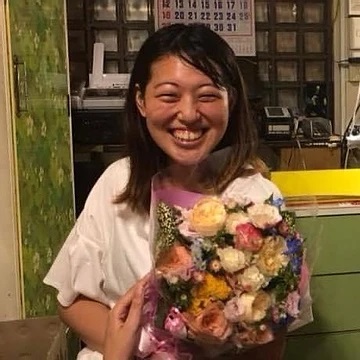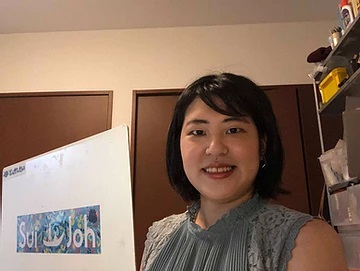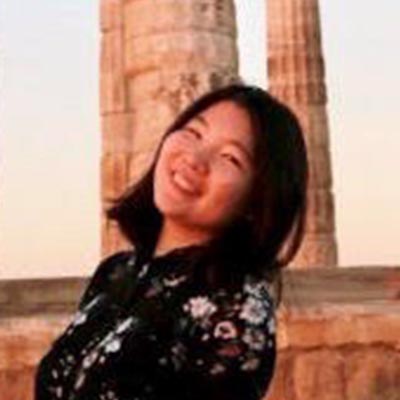Hello, APU students! This is Maasa, a fourth-year APS student.
On this occasion, I had a chance to speak online with Soko Fujino, who operates a home/private tutoring program for students who cannot attend regular school. Tutoring programs that offer online classes have recently been highlighted in TV programs and newspapers, and offer a way for APU students to replace part-time work opportunities that have dried up as a result of the COVID-19 pandemic.

Ms.Fujino was interviewed by a news program
Ms. Fujino founded Aimu, a home-private tutoring program geared toward students who cannot attend regular school, in September 2019. The program offers learning support to students who cannot pay tuition due to financial reasons or are unable to leave their homes for various reasons. It targets students from elementary to high school and assigns one tutor to each student.
Ms. Fujino says she founded Aimu to express the vision of “being true to yourself,” and she is committed to “creating a society in which people can cultivate resilience and express their individual character.” In this interview, I asked Ms. Fujino what prompted her to launch Aimu and what changes she has experienced as a result of impact from the COVID-19 pandemic.
[Profile of Soko Fujino and activities at APU]
Graduated from the College of Asia Pacific Studies at APU in 2016
Originally from: Fukuoka Prefecture
Student groups: PRENGO, FLAG
Seminar: Environmental Development taught by Prof. Qian
Topic of graduation thesis: “Exporting Japan’s water technology to other countries”
Motivation for the thesis was “the differences in living environment between Japan and Bangladesh, experienced while in Bangladesh during leave of absence.”
Post-graduation career: Spent three years working for an IT finance company
Present occupation: Established and currently operates Aimu. Main responsibilities include management and administration of tutors, marketing, and PR strategy.

First of all, could you explain what prompted you to establish Aimu?
When I was still studying at APU, I took a social stratification class in which I learned that “one in seven Japanese people lives in relative poverty.” This struck me as incredibly unfair at the time, and that feeling of wanting to improve fairness in society, even if only to a small extent, is what ultimately led me to establish Aimu.
Another factor that encouraged me to start working as a home/private tutor was my experience in Bangladesh while I was taking a leave of absence from APU. In Bangladesh, I encountered children who were missing their parents or were living on the streets. I witnessed living conditions that were far inferior to those in Japan, and this caused me to reflect. Society faces a multitude of problems, and I feel I would like to improve fairness in society, even if only to a small extent, by supporting the learning of others.
Could you elaborate on the subjects taught in your program?
Aimu offers five subjects: Japanese, mathematics, science, social studies, and English. At present, we have a team of 27 tutors, 13 of which are APU students. The English subject is mainly taught by APU international students. We teach students across a range of levels from elementary to junior high and high school, so the program covers study areas tailored to individual students.
How do you believe Aimu will evolve during and after the COVID-19 pandemic?
Before the COVID-19 outbreak, I had no intention whatsoever to provide home/private tutoring services online. However, now that we have been forced to use platforms such as Zoom, I have come to realize the importance of online operations. Going forward, we plan to continue using the current hybrid system of teaching that blends online with face-to-face learning.
How have APU students who are working as tutors felt about the transition to online tutoring?
Most tutors say face-to-face tutoring is more effective, mainly because it facilitates communication. However, they understand we have no choice but to teach online in the current environment. On the other hand, the transition to online tutoring has allowed us to provide services not only to students residing in Fukuoka, but also across the entire nation, which was a new discovery. Personally, I am happy I was able to teach students living in Kansai and Kanto online.

Ms. Fujino teaching from home
Online teaching may be a positive for students who struggle to go out.
That is true. Online learning is an appropriate approach for students who have trouble commuting to classrooms, in my view. I believe students who cannot attend regular school, have learning disabilities, have limited mobility, or struggle otherwise, all seek platforms to learn while dealing with their specific conditions. I think that starting off with online learning for such students facilitates communication and has the benefit of contributing to learning.
How do you feel about education in Japan today?
I believe it is still difficult to change public education itself in Japan, but I feel social changes are progressively expanding the number of avenues through which education can be received. For example, the way attendance is treated is changing. In the past, there were no measures to handle attendance for students who could not physically attend regular school. In recent years, municipal boards of education have allowed students who cannot attend regular school due to chronic illnesses to fulfil attendance requirements if they take part in online learning (the COVID-19 outbreak has further accelerated this trend). The same applies for students who attend alternative schools. I believe the range of options through which education can be received will increase going forward as education expands beyond the limitation of physical spaces.
In closing, do you have a message for APU students?
I think the whole point of being a student is to make friends and connections. Try to take advantage of APU’s unique campus to meet students from all over the world and expand your horizons. Above all, try to find like-minded people with whom you can discuss the social and international problems that are occurring in the world. I believe APU provides an environment in which you can candidly share your opinions. I hope everyone can turn their student life into a more meaningful experience going forward!
Related links (Japanese language only)
「お母さんのほけんしつ、始めます」Round-the-clock consultation platform for students with
developmental disabilities and students who cannot attend regular school
https://www.npo-keydesign.org/hoken-shitsu-for-parents/?fbclid=IwAR0SabM8SzF4foWlv0QNW8BKFVb6QgAB4eDI-wFCofaBESdsTPbX4PFIPJc
Maasa Furumori
Hello, I’m Maasa from Japan. I was born and raised in Nara, and lived in the states for 2 and a half years during my highschool. I spend my weekend to watch movies, go to onsen, and do some outdoor activities. Climbing mt.Yufu in 2019 was one of my favorite outdoor activities I did in Oita.My next challenge is to make it to the top of mt. Kuju. As a member of SPA, we would like to spread more fun information from diversified standpoints so please check out SPA's Blog !













